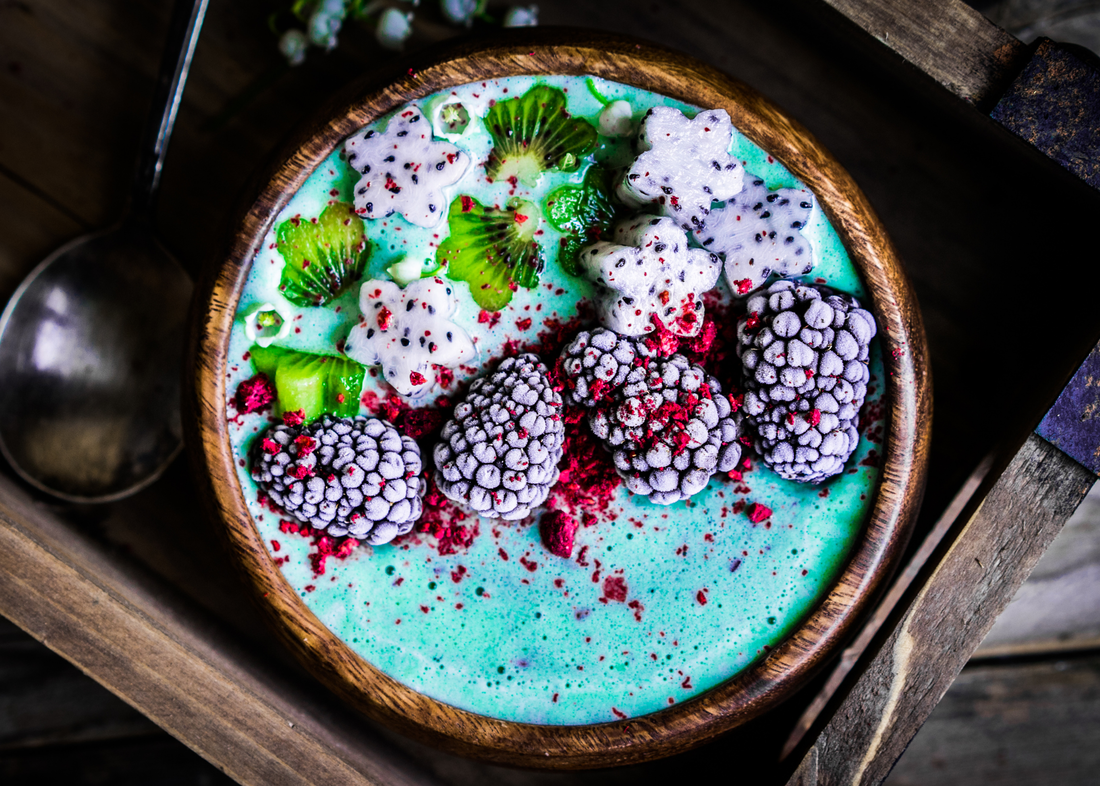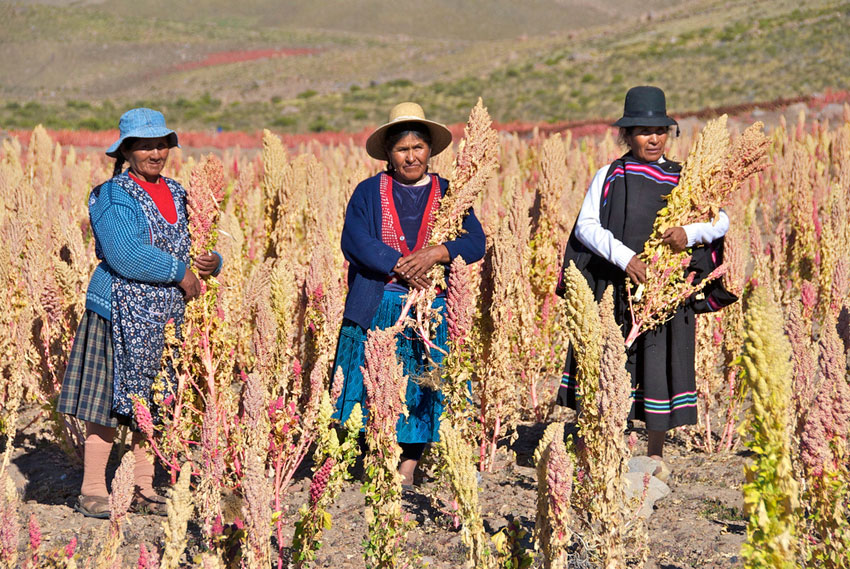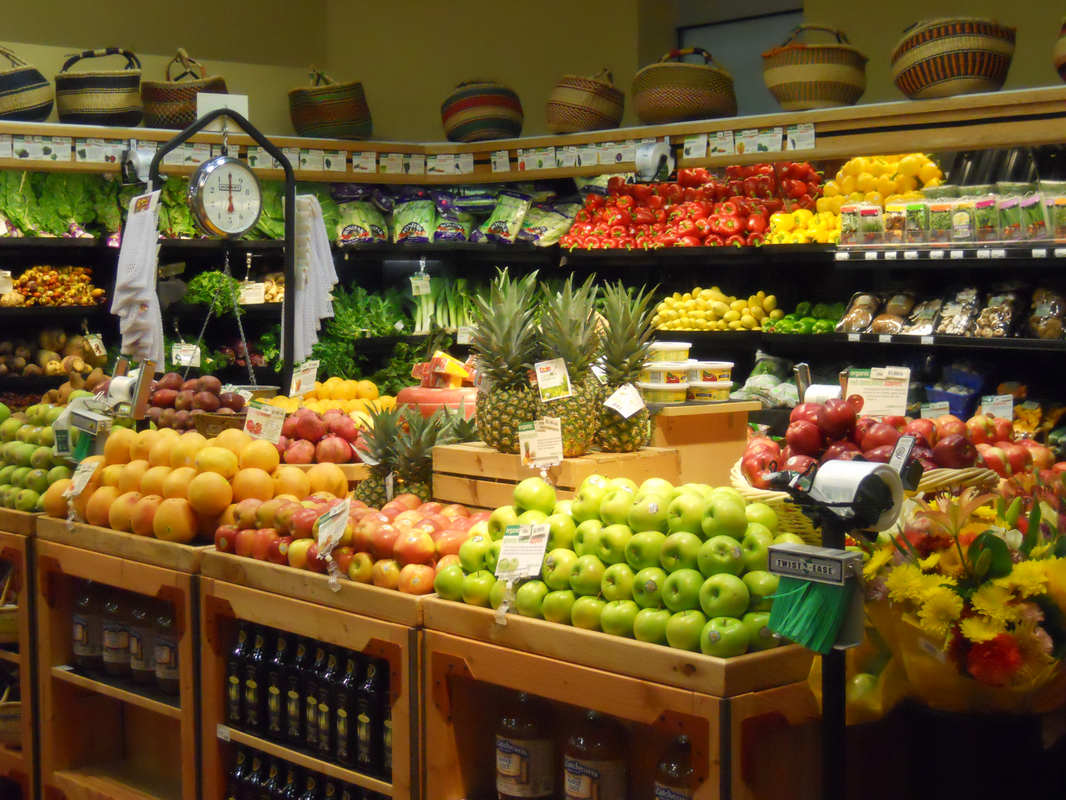Are those pretty blue and purple powders a necessity for truly holistic wellbeing... or a superfluous extra accessible to a privileged few, at the expense of a vast unseen "other"?
What are superfoods?
As humans we tend to thirst for the most exotic, the most expensive, the most foreign version of many things - that includes superfoods. Think goji berries and spirulina from Tibet and China; quinoa, acai, maca, and chia from South America; coconuts, noni fruit and durian from Southeast Asia; mesquite from Mexico; and chlorella from Japan. That means there's a lot of work and resources involved in getting those superfoods from those Andean mountain tops and high Tibetan plateaux into your blender.
Transportation of food contributes a significant percentage of all carbon emissions produced on our planet, and has impacts as far ranging as destruction of foreign ecosystems and cultures. I've found the highest concentration of superfood lovers to be within my own circles of yoga practitioners, health students, clients, and friends, who are as environmentally conscious as they are health conscious. So why do many of us continue to buy foods that carry such a huge environmental and social impact?
The less-than-super truth
As an extra kick in the guts, the quinoa-growing region of Bolivia is now suffering from health issues such as malnutrition, partly because quinoa growers who export their crop now purchase cheaper, refined grains to eat from the store.
Well-intentioned health and ethics-led consumers are unwittingly driving poverty in Bolivia. If you buy quinoa sourced from South America instead of Australian-grown quinoa, you are one of these consumers. So please check the packets before you buy!
Similarly, "wildcrafted" superfoods such as maca can be damaging to local populations despite the relatively high prices paid to locals for foraging rights. The same way our desire for chocolate, bananas, coffee and sugar has decimated local cultures and ecosystems in previous centuries.
Do we really need these extra nutrient packed "superfoods" in our smoothies and diets, despite the fact that in many cases, we are hurting other humans and impinging on their basic human rights?
Food and karma
If you're a student of yoga, you may be familiar with the term karma. The theory of karma is one of cause and effect. However, causes do not simply lead to a predictable set of knock on effects. Karma works in subtle ways, with causes combining in multitudinous complexities to create experience.
When you eat something, you eat everything that happened to make that food come into existence. You say “yes” to the hands and systems that allowed that food to come to you. You affirm a certain version of the world. If you choose bananas from a South American plantation located on destroyed rainforest land, using pesticides and shipped long distances using oil-fuelled ships, you ever so slightly reinforce this state of affairs. You make it part of your reality and experience. You say yes to that world.
If you instead purchase bananas from a local organic farm, you say yes to a different set of conditions. You strengthen community ties, and in a miniscule way weaken the hold of impersonal food corporations. You say yes to a world that treats soil, air and water with respect.
Do you rely on a food production system that restores nature and cultivates human consciousness? Or one that throws nature out of balance, relies on animal and human suffering, is grown and processed by strangers, and employs monoculture and genetic modification? And since we're talking about superfoods, one that places a higher price on the most exotic, the most antioxidant dense, and the most sexy-sounding and marketable, despite the costs?
Still feel like you need your superfood smoothies? You need not pay ten times the price for possibly a tenth of the antioxidants - seeing as the more exotic superfoods are shipped from so far away and stored for - in some cases - years, many of these foods are no longer fresh and therefore have experienced loss of antioxidant activity and superfood-ism anyway!
There are many locally grown, comparatively cheaper superfoods with an unusually high nutrient density that you could pop into your morning smoothie instead, to give you a bounce and a clear conscience. Kale, parsley, turmeric, ginger, and dandelion greens can all be grown in your own backyard easily, and in the case of dandelion, can be found growing along your fenceline!
Grounded spices such as nutmeg, cloves, cinnamon, turmeric and mustard contain the highest ORAC count of pretty much any foodstuff you can get, far exceeding noni juice or acai berries. Some of my other favourite superfoods are locally grown avocados, blueberries, hemp seeds, and locally caught fish.
And if you must have quinoa, acai or maca, and you're concerned about sustainability and social justice, do your research. If you're buying organic chocolate, make sure it's at least "fair trade." Check where it is grown and how it is harvested. We eat the energy we want to become, so choose wisely.
Does the food you eat resonate with who you are, and who you wish to be?





































 RSS Feed
RSS Feed



